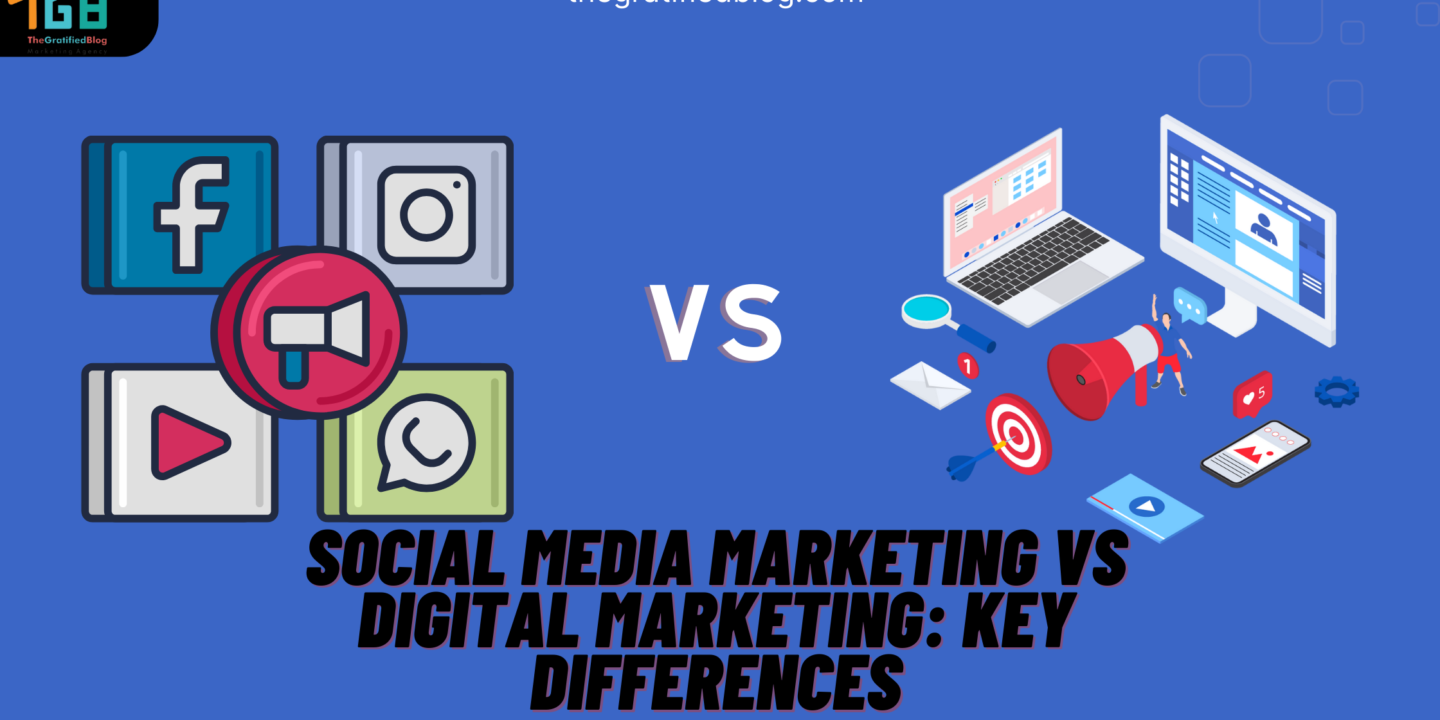
In the ever-evolving digital marketing landscape, businesses must stay informed about the various strategies available to reach their target audience effectively. Social Media Marketing vs Digital Marketing are prominent approaches often discussed in this context.
These terms are sometimes used interchangeably but encompass distinct methods and strategies. In this article, we’ll explore the differences between Social Media Marketing and Digital Marketing and provide insights into choosing the right strategy for your business.
What Is Social Media Marketing?
Social Media Marketing, often abbreviated as SMM, is a dynamic digital marketing strategy that leverages social media platforms to promote brands, products, or services.
It includes crafting and disseminating captivating content on platforms like Facebook, Twitter, Instagram, and LinkedIn to connect with a target audience. SMM aims to build brand awareness, foster customer engagement, and drive website traffic.
It’s a two-way communication channel allowing businesses to interact with customers, receive feedback, and address real concerns.
Social Media Marketing SMM encompasses various techniques, including content creation, paid advertising, influencer partnerships, and analytics-driven decision-making.
It offers an effective means to reach a vast and diverse online audience, tailoring content to suit the preferences of different platforms. SMM is vital to modern marketing strategies, enabling businesses to stay competitive and relevant in the digital age.
Key components Of Social Media Marketing Include:

- Content Creation: Developing appealing and relevant content, such as posts, images, videos, and stories, tailored to the preferences of a specific social media platform.
- Community Engagement: Building a community of followers and engaging with them through comments, likes, shares, and direct messages.
- Paid Advertising: Utilizing paid advertising features on social media platforms to reach particular demographics and broaden reach.
- Analytics And Insights: Monitoring and analyzing the performance of social media campaigns through metrics like engagement, reach, and conversion rates.
What Is Digital Marketing?
Digital marketing encompasses various online strategies to promote products, services, or brands. It utilizes digital channels like websites, social media, email, search engines, and advertising to connect with a target audience.
It’s the art and science of utilizing the internet to engage, inform, and persuade consumers. By employing SEO, content marketing, and social media advertising, digital marketing aims to boost visibility and drive traffic to generate conversions.
This dynamic field is characterized by constant evolution and analytics-driven decision-making, enabling businesses to adapt to changing consumer behavior. The goal is to foster relationships, build brand awareness, and deliver value in a digital age environment where online visibility is crucial for success.
As a result, digital marketing is a cornerstone of modern business strategies.
Key components Of Digital Marketing Include:

- Search Engine Marketing: Optimizing websites and content to improve search engine rankings (SEO) and running paid search advertising (PPC) campaigns to increase visibility on search engines.
- Content Marketing: Creating and distributing valuable, informative content to allure and captivate the intended audience, a strategy comprising blog posts, infographics, and videos.
- Email Marketing: Dispatching personalized and focused emails to nurture leads and build customer relationships.
- Affiliate Marketing: Collaborating with affiliates or partners to endorse products or services in return for commissions.
- Analytics and Data Analysis: Gathering data from various sources to analyze campaign performance, make informed decisions, and improve strategies.
Social Media Marketing vs Digital Marketing: Key Differences
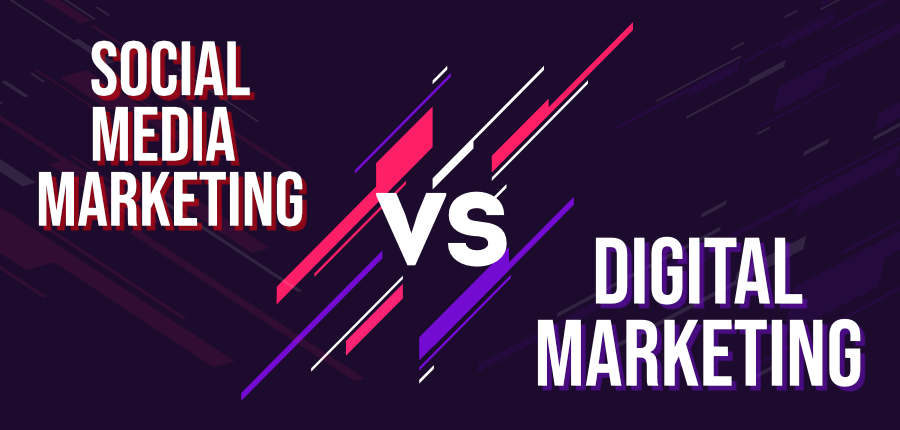
Scope And Focus
Social Media Marketing: Social Media Marketing primarily centers on establishing and nurturing a brand presence while interacting with users across different social media platforms.
It is well-suited for businesses seeking to cultivate a community, foster meaningful relationships, and ignite excitement and discussions regarding their products or services.
This approach involves leveraging the unique features and user demographics of platforms like Facebook, Instagram, Twitter, and LinkedIn to connect with the audience, interact, disseminate content, and foster a sense of belonging and loyalty among followers.
Social Media Marketing seeks to improve brand visibility, create a solid online identity, and harness the viral potential of social networks.
Digital Marketing: Digital Marketing encompasses a broader spectrum of online marketing strategies. It involves various channels and tactics, such as website optimization, email marketing, content creation, and paid advertising. Its scope is broad, covering the entire online landscape.
The focus is on reaching potential customers across the internet through various means. Digital marketing offers a comprehensive approach to online marketing, ensuring a presence across diverse online platforms.
Platforms Used
Social Media Marketing: Exclusively leverages social media platforms like Facebook, Twitter, Instagram, and LinkedIn for promotions. It primarily focuses on building and engaging audiences on these platforms, utilizing their unique features for targeted advertising and content sharing.
Social media marketing emphasizes creating a solid online presence through posts, stories, and interactive content to connect with users more personally and socially. It often relies on likes, shares, and comments as key performance indicators to measure success.
Social media marketing revolves around harnessing the power of social networks for brand visibility and engagement.
Digital Marketing: Digital Marketing: Utilizes multiple online channels, including social media, incorporating websites, search engines, emails, and other online spaces.
It encompasses a broader spectrum of online platforms, facilitating businesses to engage with their audience through diverse touchpoints, including paid advertising, SEO, content marketing, email campaigns, and more.
This versatility suits various marketing objectives, from brand awareness to lead generation and sales conversion. Digital marketing leverages data analytics to optimize strategies and measure performance across channels.
It offers a holistic approach to online promotion, catering to the diverse preferences and behaviors of the digital audience.
Objectives
Social Media Marketing: Social Media Marketing primarily aims to build and nurture relationships, create brand loyalty, and foster customer engagement. It leverages social platforms like Facebook, Twitter, and Instagram to connect with the audience, share content, and interact directly with customers.
The key objectives include enhancing brand visibility, generating conversations, and maintaining a solid online presence. It focuses on community-building, two-way communication, and delivering tailored content to build trust and rapport with the target audience.
Social media marketing aims to create a loyal and engaged customer base through ongoing interaction and personalized content strategies.
Digital Marketing: Has a broader set of goals, including lead generation, sales conversion, website traffic, brand exposure, and market expansion.
It encompasses various online channels and strategies, including search engine optimization (SEO), email marketing, content marketing, pay-per-click advertising, and more. The primary focus is leveraging digital platforms to achieve business objectives and reach a global audience.
Content-Type
Social Media Marketing: Mainly relies on visual and short-form content, including images, videos, and concise text, to engage with the audience. It primarily operates on social media platforms like Facebook, Instagram, Twitter, and LinkedIn, leveraging their user base for targeted outreach.
Social media marketing builds a community and fosters two-way communication between brands and followers. It often emphasizes brand personality and interaction, using hashtags, mentions, and comments to connect with users.
The primary goal is to improve the brand’s visibility, engagement, and customer loyalty within the confines of specific social platforms.
Digital Marketing: digital marketing encompasses a broader spectrum of online strategies. Social media marketing is a subset within it, concentrating on building a brand’s presence and fostering conversations on social networks.
Digital marketing can involve various channels like SEO, email marketing, paid advertising, and website optimization, making it a comprehensive approach, whereas social media marketing centers on utilizing the power of social platforms to connect with audiences more interactively and immediately.
Paid Advertising
Social Media Marketing: Often relies on paid advertising within specific social media platforms, targeting audiences based on demographics and interests. Advertisers can use tools provided by platforms like Facebook Ads and Instagram Ads to reach their desired audience precisely.
This approach leverages the extensive user data available on social media to optimize ad placement, ensuring content reaches the right people.
Digital Marketing: Paid Advertising in Digital Marketing incorporates paid advertising on various platforms, including search engines (e.g., Google Ads), social media, and other online ad networks.
This approach offers a versatile way to reach potential customers by leveraging the extensive reach and targeting options available across the digital landscape. It involves paid promotion on websites, mobile apps, email marketing, and more, allowing businesses to tailor their ad campaigns to specific demographics and interests.
Digital Marketing’s paid advertising can be highly data-driven and result-oriented, offering precise measurement and optimization of ad performance for a more efficient use of marketing budgets.
Social Media Marketing vs Digital Marketing: Choosing The Right Strategy
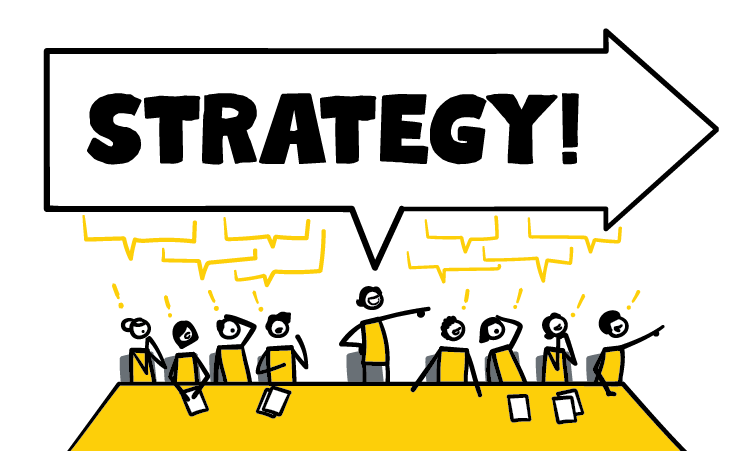
The choice between Social Media Marketing and Digital Marketing strategy relies on your business goals, target audience, and resources. When making a well-informed decision, take into account the following factors:
Define Your Goals: To make an informed choice distinguishing between social media marketing and digital marketing, you must establish your goals. Social media marketing may be your ideal choice to increase brand awareness.
Digital marketing through search engines and websites might be more effective for lead generation or direct sales.
Know Your Audience: A deep comprehension of your target audience is essential. If your audience is actively engaged on social media platforms like Facebook, Instagram, or Twitter, social media marketing can be a direct route to reach them.
However, digital marketing is the way to go if they primarily search for information on Google or engage with websites.
Budget and Resources: Evaluate your budget and resources to align them with your chosen strategy. Social media marketing often requires consistent content creation, community management, and advertising spending.
Digital marketing can encompass various cost-effective strategies like SEO and content marketing, making it a viable option for businesses with limited resources.
Content Strategy: Your content strategy is pivotal in determining your marketing approach. Social media marketing thrives on visual content, making it suitable for businesses producing compelling images and videos.
Digital marketing, on the other hand, includes a broader array of content types, including blog posts, infographics, and ebooks, offering flexibility to cater to different audience preferences.
Performance Tracking: Choose how you’ll measure the success of your marketing efforts. Engagement metrics like likes, shares, and comments are crucial for social media marketing.
In digital marketing, you have a broader array of essential performance metrics, such as website traffic, conversion, and click-through rates, enabling a more comprehensive assessment of your campaigns’ effectiveness. Your choice should align with the metrics most relevant to your goals and audience.
FAQ’S
Q1. Do You Need Social Media For Digital Marketing?
Ans: It is a powerful tool for digital marketing, allowing businesses to connect with a global audience. It provides a platform for brand visibility, customer engagement, and content distribution. However, its necessity depends on the business’s goals and target audience.
While some industries thrive on social media, others may find better results through other digital marketing channels like SEO, email, or content marketing.
Social media in digital marketing should align with a well-defined strategy and specific business objectives.
Conclusion
Social Media and Digital Marketing are essential in an effective online marketing strategy. The choice between the two depends on your business objectives, target audience, and available resources.
By understanding the key differences and aligning your strategy with your goals, you can make informed decisions that maximize your digital marketing success.
In many cases, a well-rounded approach that combines both Social Media Marketing and Digital Marketing elements can be the most effective way to reach and engage your audience in the ever-evolving digital landscape.


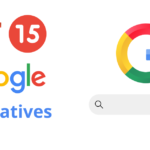

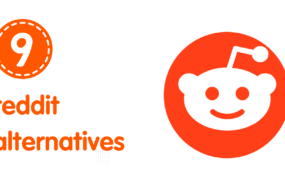
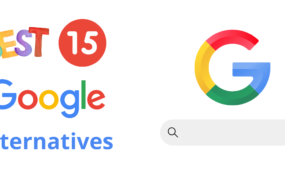


No Comments